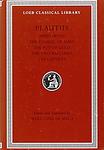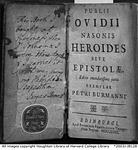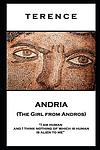The Greatest Roman Books of All Time
Click to learn how this list is calculated.
This list represents a comprehensive and trusted collection of the greatest books. Developed through a specialized algorithm, it brings together 284 'best of' book lists to form a definitive guide to the world's most acclaimed books. For those interested in how these books are chosen, additional details can be found on the rankings page.
Genres
Countries
Date Range
Reading Statistics
Click the button below to see how many of these books you've read!
Download
If you're interested in downloading this list as a CSV file for use in a spreadsheet application, you can easily do so by clicking the button below. Please note that to ensure a manageable file size and faster download, the CSV will include details for only the first 500 books.
Download-
1. The Aeneid by Virgil
This epic poem tells the story of Aeneas, a Trojan who travels to Italy, where he becomes the ancestor of the Romans. It includes a series of prophecies about Rome's future and the deeds of heroic individuals, and is divided into two sections, the first illustrating the hero's journey and the second detailing the wars and battles that ensue as Aeneas attempts to establish a new home in Italy. The narrative is deeply imbued with themes of duty, fate, and divine intervention.
-
2. Confessions by Augustine
"Confessions" is an autobiographical work by a renowned theologian, in which he outlines his sinful youth and his conversion to Christianity. It is written in the form of a long, introspective prayer directed to God, exploring the author's spiritual journey and deep philosophical ponderings. The book is renowned for its eloquent and deeply personal exploration of faith, making it a cornerstone of Christian theology and Western literature.
-
3. Metamorphoses by Ovid
"Metamorphoses" is a classical epic poem that narrates the history of the world from its creation to the deification of Julius Caesar within a loose mythico-historical framework. The narrative is filled with stories of transformation, focusing on myths and legends of the Greek and Roman world. The tales, which include the stories of Daedalus and Icarus, King Midas, and Pyramus and Thisbe, among others, are all linked by the common theme of transformation, often as a punishment or reward from the gods.
-
4. De Rerum Natura by Lucretius
"De Rerum Natura" is a long didactic poem written in the first century BC, which explores Epicurean philosophy and the nature of the universe. The text delves into topics such as the nature of the gods, the atomic structure of the universe, human sensation and thought, and the fear of death. The author argues that understanding the physical world can free humans from superstition and fear, leading to peace of mind and true happiness.
-
5. Meditations by Marcus Aurelius
"Meditations" is a collection of personal writings by a Roman Emperor, providing deep insights into Stoic philosophy. The book is a series of introspective reflections on how to deal with life's challenges with wisdom, integrity, self-discipline, and benevolent affection for all mankind. It serves as a manual for self-improvement and moral guidance, emphasizing the importance of accepting things outside of one's control and maintaining a tranquil mind amidst adversity.
-
6. The Golden Ass (Metamorphoses): Or Metamorphoses by Apuleius
This classic novel follows the protagonist, a young man who is transformed into a donkey after meddling with magic he doesn't understand. His journey takes him through a series of adventures, where he encounters a variety of characters from different walks of life and gets into all sorts of trouble. Through his experiences, he gains a deeper understanding of the human condition and the world around him. The narrative also includes several mythological tales and allegories, including the famous story of Cupid and Psyche. Eventually, the protagonist regains his human form through divine intervention, having learned valuable lessons about life, love, and humanity.
-
7. Annals by Cornelius Tacitus
"Annals" is a historical work that provides a comprehensive account of the Roman Empire from the reign of Tiberius in 14 AD to the death of Nero in 68 AD. The author, a senator and historian of the Roman Empire, explores the inner workings of Roman politics, military campaigns, and social culture during this period. The book offers an in-depth look at the political machinations, power struggles, and the moral decay of the Roman elite, providing a critical perspective on the Roman emperors and their rule.
-
8. The Odes by Horace
"The Odes" is a collection of lyric poems by an ancient Roman poet. The poems cover a wide range of themes, including love, friendship, wine, nature, morality, and the human condition. The author's style is noted for its elegance, wit, and mastery of meter. The poems also reflect the social and political context of Rome during the author's lifetime, providing insight into the culture and values of the period.
-
9. The City of God by Augustine
The book is a philosophical and theological masterpiece, written as a defense of Christianity after the sack of Rome in 410 AD. The author contrasts the earthly city, characterized by pride and love of self to the point of contempt for God, with the heavenly city, characterized by love of God to the point of contempt for self. He argues that though the earthly city may seem dominant in the present age, the heavenly city will ultimately triumph. The book is a profound exploration of history, philosophy, religion, and the human condition.
-
10. Lives of the Caesars by Suetonius
"Lives of the Caesars" is a historical narrative that provides a detailed account of the personal and public lives of the first twelve Roman emperors, from Julius Caesar to Domitian. The author presents a vivid depiction of their character, behavior, appearance, and private lives, as well as their political actions, military exploits, and administrative policies. The book is a valuable source of information about the Roman Empire's early days, offering a unique perspective on the power, corruption, and extravagance of the Roman elite.
-
11. Letters from a Stoic by Seneca
"Letters from a Stoic" is a collection of moral epistles written by a renowned Stoic philosopher. The letters provide practical guidance on everything from dealing with adversity and the pursuit of wisdom to the folly of consumerism and the nature of friendship. The author's stoic philosophy encourages peace of mind through understanding and accepting the natural order of the universe, and his letters offer timeless wisdom and insights that are still relevant today.
-
12. Histories by Cornelius Tacitus
"Histories" is a comprehensive account of the Roman Empire from 69-96 AD, a period marked by significant political turmoil. It provides an in-depth look at the reigns of four emperors: Galba, Otho, Vitellius, and Vespasian, along with the social and political upheavals of the time. The narrative also covers the Jewish rebellion and the burning of the Jerusalem Temple, offering a rich historical context of the period. Despite some gaps in the record, it remains a crucial primary source for understanding this era of Roman history.
-
13. Poetry by Quintus Lutatius Catulus
This book is a collection of ancient Roman poetry by a renowned statesman and poet. The poems reflect the author's experiences, thoughts, and feelings about life, love, politics, and society during the Roman Republic era. The author's eloquent and vivid writing style, combined with his astute observations and insights, make this book a valuable resource for understanding Roman culture and history.
-
14. Natural History by Pliny (the Elder)
"Natural History" is an extensive work of literature that provides a comprehensive look at the knowledge of the natural world during the Roman era. The book is divided into 37 volumes, each focusing on different aspects such as geography, anthropology, zoology, botany, and mineralogy. The author's curiosity and fascination with the world are evident in his detailed observations and descriptions. The book also includes discussions on art, sculpture, and various other topics, providing a rich and detailed snapshot of the Roman understanding of the world.
-
15. Titi Livi Ab urbe condita libri by Livy
This historical work offers a comprehensive narrative of the history of Rome, from its mythical origins to the reign of the Roman Emperor Augustus. The author chronicles the major political, military, and social events of the Roman Republic, including the founding of the city, the establishment of the Republic, the Punic Wars, and the rise of Julius Caesar. The book is a significant source of information about the early history of Rome and is often considered one of the most important works of Roman history.
-
16. The Consolation of Philosophy by Boethius
"The Consolation of Philosophy" is a philosophical work written in the 6th century, where the author, imprisoned and awaiting execution, engages in a series of dialogues with Lady Philosophy about the nature of life and human happiness. The author grapples with the harsh realities of his own life, including his fall from favor, his unjust imprisonment, and impending execution. Through these dialogues, the author learns to understand life from a philosophical and spiritual perspective, finding consolation and peace amidst his dire circumstances. The work is a profound meditation on fate, free will, time, and eternity.
-
17. Germania by Cornelius Tacitus
"Germania" is a historical and ethnographic work that provides a detailed description of the lands, customs, and tribes of the Germanic people in the first century AD. The author, a Roman historian and senator, offers a comprehensive account of the geography, anthropology, social institutions, and military practices of the Germanic tribes, often comparing their culture and values to those of the Romans. The work is considered a valuable source of information about the ancient Germanic tribes, despite its possible biases and inaccuracies.
-
18. Amphitryon by Plautus
The play is a comedic tale set in ancient Greece, where the god Jupiter, enamored with Alcmena, the wife of the general Amphitryon, takes on her husband's form to seduce her while Amphitryon is away at war. Meanwhile, Mercury, the messenger god, assists Jupiter by disguising himself as Amphitryon's slave, Sosia. The resulting confusion and mistaken identities lead to a series of humorous situations, as the real Amphitryon returns home to find his place usurped by the god. The play explores themes of deception, infidelity, and the interplay between gods and mortals, all wrapped up in a farcical package that entertains while it provokes thought about the nature of identity and trust.
-
19. On The Ends Of Good And Evil by Marcus Tullius Cicero
"On the Ends of Good and Evil" is a philosophical work that explores the ethical theories of Hellenistic schools, including Stoicism, Epicureanism, and the Peripatetic tradition. Through a series of dialogues, the text delves into the nature of happiness and the ultimate end of human action, examining what constitutes the highest good. The author critiques and compares the doctrines of these schools, ultimately defending the Stoic view that virtue is the sole basis of happiness and the ultimate goal in life, while also acknowledging valuable insights from other philosophical traditions.
-
20. Thyestes by Seneca
"Thyestes" is a classic tragedy that centers around the mythological figures of the House of Atreus. The story unfolds as Atreus, the King of Mycenae, seeks revenge on his brother Thyestes for committing adultery with his wife. In a gruesome act of vengeance, Atreus kills Thyestes' sons and serves them to him at a feast. The narrative explores themes of power, betrayal, revenge, and the horrific consequences of unchecked ambition.
-
21. Catiline Orations by Marcus Tullius Cicero
"Catiline Orations" is a series of speeches given by a renowned Roman statesman, which were aimed at exposing and condemning the conspiracy led by Lucius Sergius Catilina. The speeches, delivered in the Roman Senate, are a masterful display of oratory skills and political acumen, as the statesman successfully manages to turn the Senate against Catiline, ultimately leading to his downfall. The book offers an in-depth study of these speeches, providing valuable insights into Roman politics, rhetoric, and the art of persuasion.
-
22. Catiline's War, The Jugurthine War, Histories by Sallust
This book is a combination of three works by a Roman historian and politician, focusing on the political and military events of the late Roman Republic. It first covers the conspiracy led by Catiline in 63 BC, then shifts to the war against Jugurtha in North Africa, and finally provides a fragmentary history of Rome from 78-67 BC. The author uses these events to critique the moral decay of Rome, highlighting the corruption, greed, and ambition that he believed led to the fall of the Republic.
-
23. Heroides by Ovid
The book is a collection of fifteen epistolary poems presented as though written by various mythological heroines of Greek and Roman lore to their absent lovers. These letters express the women's emotions as they lament their separation, recount their memories, and plead for their lovers' return. The work explores themes of love, betrayal, and the female perspective within the context of classical myths, offering a unique insight into the emotional lives of characters such as Penelope, Dido, and Medea, who are traditionally depicted through the eyes of male heroes and writers.
-
24. The Girl From Andros by Terence
"The Girl From Andros" is a classic Roman comedy that revolves around the complexities of love and mistaken identity. The plot centers on a young Athenian man who falls in love with a girl believed to be a courtesan from the island of Andros, but who is, in fact, a freeborn woman. As he seeks to marry her, he must navigate the social expectations of his status, the interference of his slave who tries to help him with a cunning plan, and the revelation of the girl's true identity. The play humorously explores themes of class, romance, and the roles of women in ancient society, all while employing the typical misunderstandings and deceptions of comedic storytelling.
-
25. The Mother In Law by Terence
The play is a classic Roman comedy that revolves around the convoluted love lives and familial disputes of its characters. The central plot focuses on a young man who impregnates his lover, the daughter of his neighbor. The situation is further complicated by the young man's domineering mother-in-law, who is unaware of the relationship and pregnancy. The narrative unfolds with a series of misunderstandings, schemes, and comic relief provided by a cunning slave, ultimately leading to resolutions that restore harmony and social order. The work explores themes of love, deception, and the dynamics of power within family structures, all while offering a satirical look at Roman society.
Reading Statistics
Click the button below to see how many of these books you've read!
Download
If you're interested in downloading this list as a CSV file for use in a spreadsheet application, you can easily do so by clicking the button below. Please note that to ensure a manageable file size and faster download, the CSV will include details for only the first 500 books.
Download





















